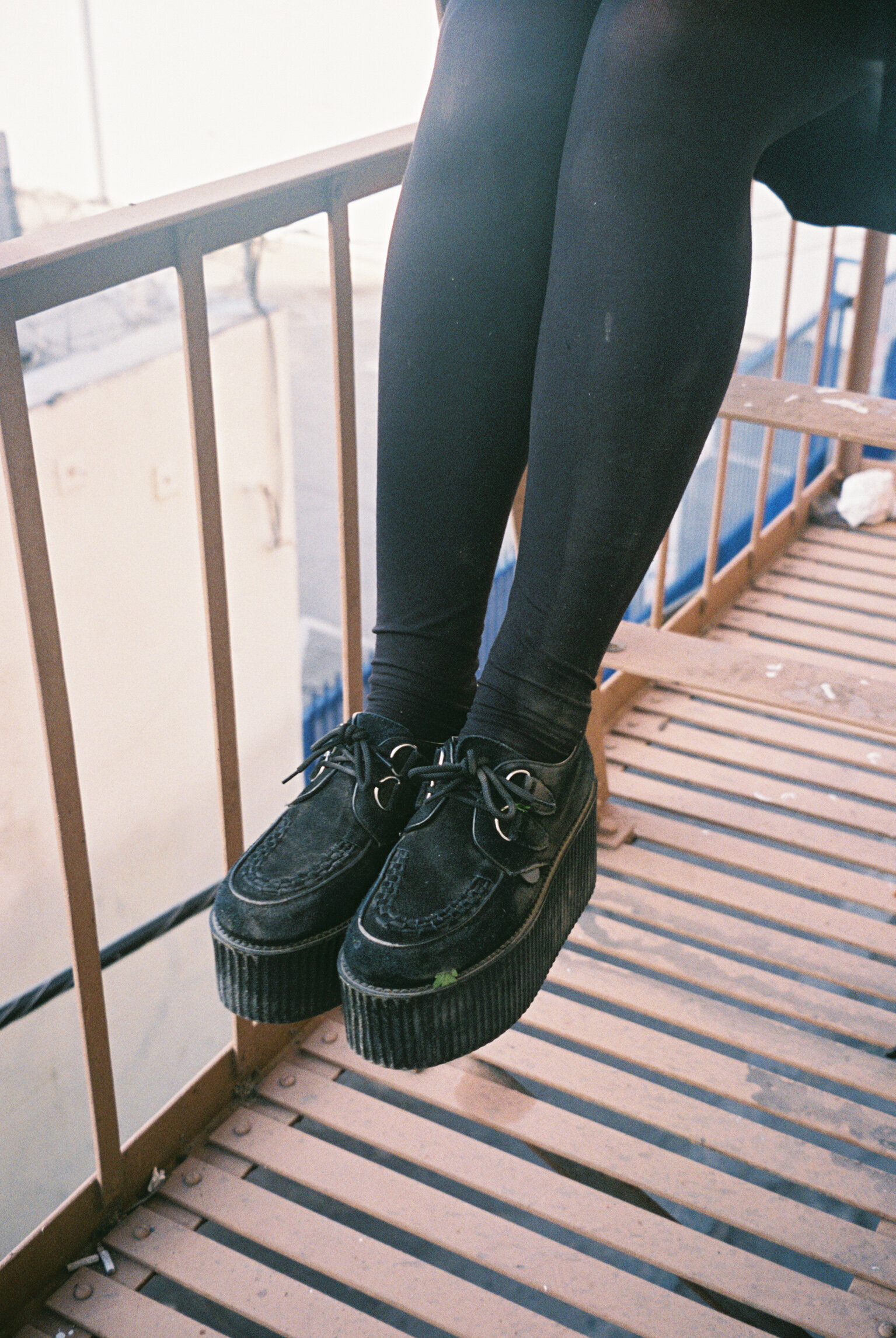Jenn Pelly
⤏ IN CONVERSATION WITH KATIE ALICE GREER
⤏ PHOTOS BY KARA VORABUTR
⤏ ORIGINALLY PUBLISHED JUNE 2018
Jenn Pelly is a music writer living in Brooklyn, New York. Her first book, 33 1⁄3’s The Raincoats (on the band’s deeply influential debut album), was released last year. Jenn and I became friends after she interviewed my band, Priests, a few times. I am continually inspired by her ceaselessly curious mind and dedication to her craft. In a fun role reversal, I got to interview her for a change.
KATIE: Did you keep a diary or a journal as a kid?
JENN: Journaling has always been a bit of a survival mechanism for me. I’ve kept diaries for as long as I can remember. It helps me process my life in a really therapeutic way. Joan Didion’s essay “On Keeping a Notebook” is like a sacred text to me. I was so invested in Livejournal as a teenager and somewhere along the line I started actively keeping notebooks, not necessarily to document my day-to-day, but to try and figure stuff out. Journaling allows a kind of privacy that is rarer and rarer these days.
K: What’s the first time you remember writing something that excited you, that felt special?
J: It’s a natural tendency of journalists to hate everything we write as soon as it’s published, so that’s a hard question to answer! But one story comes to mind. It was for my high school newspaper and it was actually co-authored by me and my twin sister, Liz, when we were running the school paper together. The story is a little complicated, but basically there was this new policy that had been implemented in the music department in our school district, and it angered a lot of people. We could tell that this was a corrupt policy, and we decided to investigate it and interrogate it. We interviewed 18 people, from the superintendent to anonymous office-workers to people in neighboring school districts for comparison. The policy was repealed after our article ran. We saw firsthand that a piece of our writing could have actual consequences. I reread this article recently and I was kind of astonished by the level of reporting we did. You really have to be a self-starter as a journalist. You have to have so much conviction, and believe in yourself and your ideas so completely because even if you have the trust and guidance of an editor or a publication, it’s ultimately up to you to see a story through.
K: Can you recall the first time you heard music that inspired a strong reaction in you?
J: When I was 13, “Life Makes No Sense” by The Ataris was a revelation. It was my first exposure to music beyond the radio, and I had never heard someone say things about life so bluntly in music before. My friend Lauren introduced me to The Ataris and so many other bands in seventh grade and she totally changed my life forever. When I listen to that song and band now, I think of how lucky I was to have a friend like Lauren to expand my concept of music and by extension the world. A couple years later I heard Fiona Apple for the first time, which was really a line in the sand for me. As a teenager I often felt like people did not take me seriously, and her music was such a potent antidote to that. She is still my favorite songwriter and her music empowers me like no other art on Earth ever has.
“You have to have so much conviction, and believe in yourself and your ideas so completely. It’s ultimately up to you to see a story through.”
K: You’re kind of known amongst friends for wearing an informal “all black” uniform, [laughs]. When did this start? What’s your style like?
J: I’ve circled through so many identities with style. In middle school I wore a lot of band t-shirts, hoodies, and plaid skirts, and I loved getting bands to sign my sneakers. In high school I was heavily into fashion. I took fashion illustration classes, wrote about fashion for local and national publications, attended Fashion Week, interned at magazines, and thrifted obsessively. I was actually really inspired by color-bursting Japanese street fashion. I loved the magazine Fruits and Italian designers like Emilio Pucci. Fashion was an intense phase, but ultimately it wasn’t for me. Now clothing stirs up all kinds of memories and emotions for me and it can be distracting to think about on a daily basis. Wearing all black is something I can cope with. I’m basically streamlining so that I am free to think about other things. I really committed to all black towards the end of college. I find it incredibly liberating.
K: Did growing up on Long Island with sisters influence your taste in music or anything else?
J: Growing up with two sisters who are my best friends is the coolest and luckiest part of my life. I think we’ve always emboldened each other to explore our interests as deeply as possible. As teenagers Liz and I shared all of our dreams.
K: You’re a twin and your sister is also a writer, but you’ve got another sister who is a stylist (and former Dash Doll!) Does Marissa inspire you with style ideas?
J: My little sister works styling celebrities, which is so sick. She used to work at the DASH store in Soho and she has a Yeezus tattoo. Donda should really hire her one day. She is one of the hardest working people I know and I learn from her constantly. Her engagement with pop culture has expanded my understanding of people. I pretty much hated all mainstream culture from ages 13 to 20 and that slowly started changing when she began showing me more things — like Drake, for example.
K: You recently published a fantastic book on The Raincoats, a pretty formative band for many of us. What is it like to get up close and personal with people who have shaped much of your worldview?
J: The process of working on the book was life-changing. My book is specifically about The Raincoats’ self-titled debut album from 1979, and I feel like investigating the story of this record made me understand a lot of things about myself and how I exist in the world as a shy, scrappy person. I refer to “Raincoats Logic” at a point in the book: this idea that I can apply lessons from The Raincoats to my life. A lot of it has to do with a lyric from their song, “Fairytale in the Supermarket.” They say, “No one teaches you how to live.” We’re all figuring things out as we go along, always. Life is an act of improvisation.
“If I can’t figure out a sentence, a word, a lede, or a kicker, it always comes to me in the shower.”
K: What are you most proud of in The Raincoats book? Is there any particular passage (I mean, I hope there are many, it’s so good) where, you think about it or re-read it and you’re like, damn, Jenn. Hell yeah.
J: I’m proud that I was able to interview so many people. I’m proud that I was able to fuse reporting, criticism, art history, political history, critical theory, and a small bit of first-person narration. I wanted the book to feel a bit like a collage, to reflect the collage-like nature of The Raincoats album itself.
K: How do you deal when you feel like you’ve hit a wall with your work? There must’ve been moments with this book where you were not sure how to move forward. Do you ever struggle with any sort of “writer’s block”?
J: Often I’ll try to read a book that has nothing to do with the subject I’m writing about, but feels spiritually akin in some subtle way. Taking a shower always helps. I don’t know why, but I don’t question it. If I can’t figure out a sentence, a word, a lede, or a kicker, it always comes to me in the shower.
K: Let’s say a person told you they didn’t understand the point of music criticism. If you were in the mood and they truly wanted to understand, what would you tell them?
J: First I would tell them to read Ellen Willis’ Out of the Vinyl Deep or Greil Marcus’ Mystery Train and if they still don’t understand the purpose of music criticism, after reading those books, that would be weird. Have you ever seen a movie or gone to a show and had your mind blown, or maybe gone through a series of intense life events, and afterwards were kind of speechless and thought, “This is going to take me a little while to fully process.” We need to process stuff in addition to experiencing it. In her book Devotion, Patti Smith answers the question “Why do I write?” with a simple statement, “Because we cannot simply live.” I think this sentiment applies to listening to music as well, if you live for it.
K: What kind of advice would you give a teenager interested in music criticism?
J: Find a way to start doing it and do it as much as you can. Write for a school publication if you’ve got one or start one with your friends. Get a copy of the SPIN Alternative Record Guide. Go to shows, watch the opening bands, try to write about artists and scenes that no one else is covering. See if there is a college or community radio station around where you can host a show or volunteer. Just read and write constantly. Download the Freedom app onto your phone. Hang out at the library. Study the art of writing a great lede.
⤏ BUY THE PRINT EDITION OF JR HI THE MAGAZINE | ISSUE 002 HERE.
⤏ KATIE ALICE GREER (SHE/HER) IS A MUSICIAN, PRODUCER AND RECORD LABEL OWNER WHO RECENTLY RELOCATED TO LOS ANGELES FROM WASHINGTON, D.C. SHE LOVES ALL KINDS OF MUSIC, CATS, SOCIAL JUSTICE MOVEMENTS THAT SKEW TOWARDS SERVING THE MANY OVER THE FEW, MOVIES, AND THE LOS ANGELES PUBLIC ACCESS TV SHOW, LOST LA.




